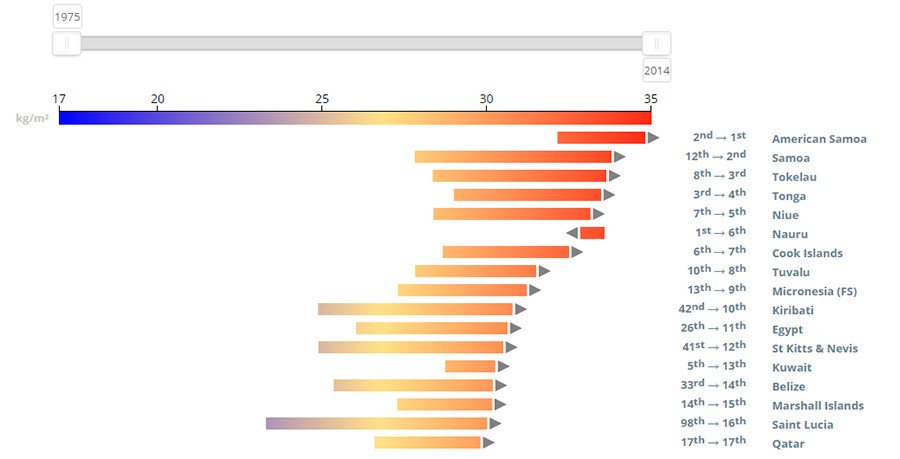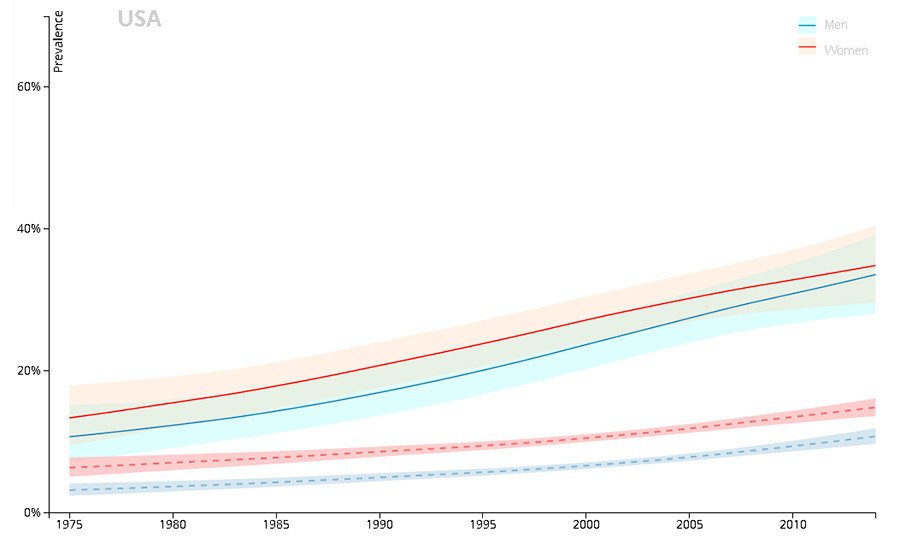Obesity more than doubles in four decades, 1 in 5 humans will be obese by 2025 – WHO

In the most wide-ranging population weight study ever performed, researchers found that 266 million men and 375 million women were obese worldwide in 2014, and that these figures will get rapidly worse over the next decade.
With help from the UN-backed World Health Organisation (WHO), Imperial College London used more than 700 researchers to collect the weight of more than 20 million people, for a study that is to be published in The Lancet medical journal.
They found that obesity in men has more than trebled from 3.2 percent in 1975, to 10.8 percent in 2014. In women, it has more than doubled from 6.4 to 14.9 percent. Graphs show that the process is accelerating since the turn of the millennium, and by 2025, 18 percent of men and 21 percent of women will be obese. A 6’00” person weighing over 104 kg would be considered obese, using the WHO-prescribed body mass index table.
Some 2.3 percent of men and 5 percent of women are severely obese – meaning a 6’00” person would weigh over 130 kg. In this category circulatory disorders, heart disease and diabetes are all likely, with increased possibility of cancer and other life-threatening conditions, as well as a noticeable decrease to everyday quality of life.
“The number of people across the globe whose weight poses a serious threat to their health is greater than ever before. And this epidemic of severe obesity is too extensive to be tackled with medications such as blood pressure lowering drugs or diabetes treatments alone, or with a few extra bike lanes,” said Majid Ezzati, the senior author of the study from the School of Public Health at Imperial.
In some countries the increase in obesity may be a function of economic growth, meaning that malnutrition has also gone down. Since 1975, the number of underweight men has gone down from 14 to 9 percent, and underweight women from 15 to 10.
But this is not sufficient compensation for the number of people becoming obese in developed countries, as well as developing ones, which do not have the healthcare resources to efficiently manage chronic conditions that result from the population rapidly gaining weight.
“Our research has shown that over 40 years we have transitioned from a world in which underweight prevalence was more than double that of obesity, to one in which more people are obese than underweight. Although it is reassuring that the number of underweight individuals has decreased over the last four decades, global obesity has reached crisis point,” said Ezzati.
All ten of the world’s most obese states are tiny Pacific islands, including American Samoa, Tonga and Nauru. Middle Eastern and North African states are not far behind.


The United States remains the most obese high-income Western country, and has moved from 50th to 36th in the world since 1975. It is followed by New Zealand, Greece and the UK, with Switzerland enjoying the fewest obese people among its population among all the European states.

Ranked 192nd, Japan is the least obese wealthy county in the world, due to a combination of genetics, good diet, and solid public policy. It is one of only a handful of states in world, whose people have actually got thinner since the 1970s.
Russia is 72nd on the list, fatter than it was previously, but relatively thinner, as other countries have seen their citizens swell in size.
“We hope these findings create an imperative to shift responsibility from the individual to Governments, and to develop and implement policies to address obesity. For instance, unless we make healthy food options like fresh fruits and vegetables affordable for everyone, and increase the price of unhealthy processed foods, the situation is unlikely to change,” said Ezzati.
“We need coordinated global initiatives – such as looking at the price of healthy food compared to unhealthy food, or taxing high sugar and highly processed foods – to tackle this crisis.”













